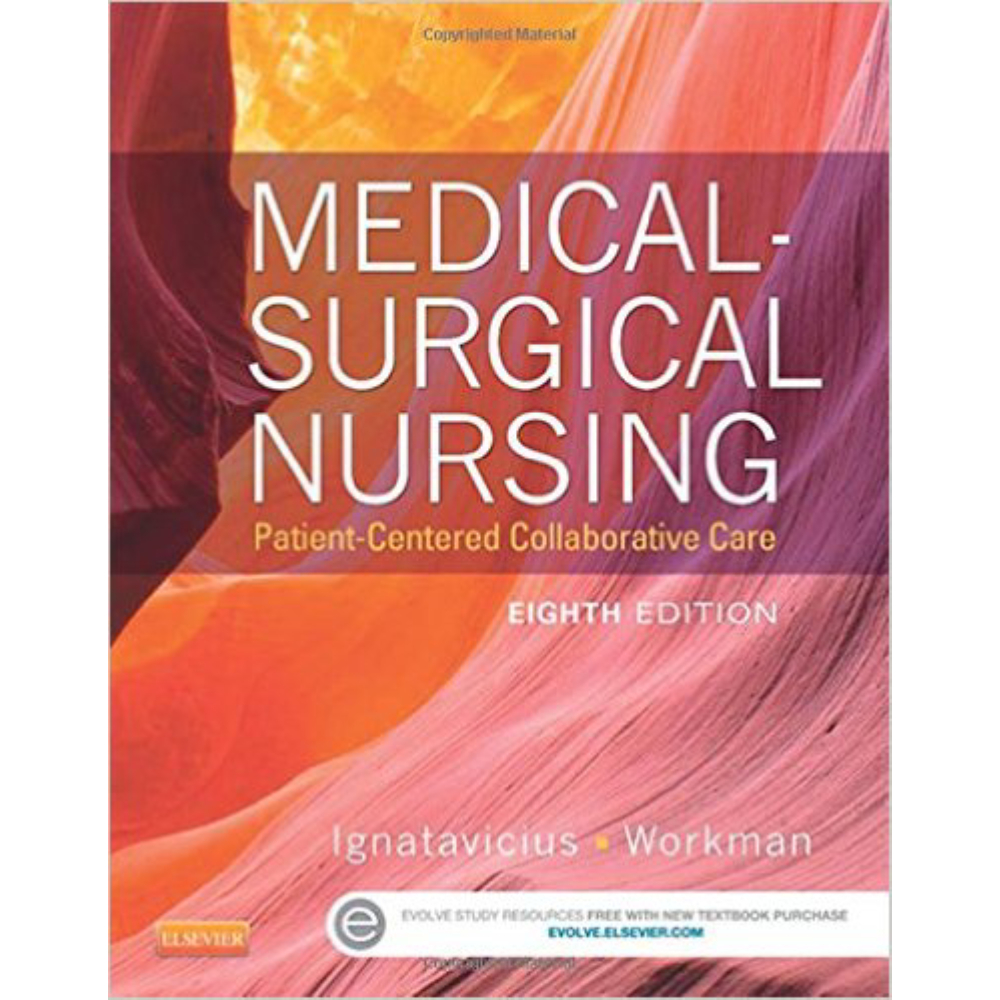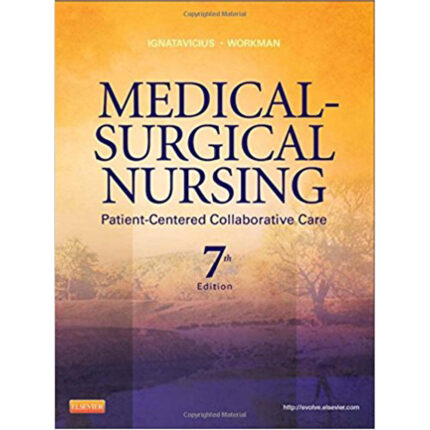Medical Surgical Nursing Patient Centered Collaborative Care, 8th Edition by Donna D. Ignatavicius – Test Bank
MULTIPLE CHOICE
1. A nurse teaches clients at a community center about risks for dehydration. Which client is at
greatest risk for dehydration?
a. A 36-year-old who is prescribed long-term steroid therapy
b. A 55-year-old receiving hypertonic intravenous fluids
c. A 76-year-old who is cognitively impaired
d. An 83-year-old with congestive heart failure
ANS: C
Older adults, because they have less total body water than younger adults, are at greater risk
for development of dehydration. Anyone who is cognitively impaired and cannot obtain
fluids independently or cannot make his or her need for fluids known is at high risk for
dehydration.
DIF: Understanding/Comprehension REF: 156 KEY: Hydration
MSC: Integrated Process: Nursing Process: Assessment
NOT: Client Needs Category: Physiological Integrity: Basic Care and Comfort
2. A nurse is caring for a client who exhibits dehydration-induced confusion. Which
intervention should the nurse implement first?
a. Measure intake and output every 4 hours.
b. Apply oxygen by mask or nasal cannula.
c. Increase the IV flow rate to 250 mL/hr.
d. Place the client in a high-Fowler’s position.
ANS: B
Dehydration most frequently leads to poor cerebral perfusion and cerebral hypoxia, causing
confusion. Applying oxygen can reduce confusion, even if perfusion is still less than
optimal. Increasing the IV flow rate would increase perfusion. However, depending on the
degree of dehydration, rehydrating the client too rapidly with IV fluids can lead to cerebral
edema. Measuring intake and output and placing the client in a high-Fowler’s position will
not address the client’s problem.
DIF: Applying/Application REF: 156 KEY: Hydration
MSC: Integrated Process: Nursing Process: Implementation
NOT: Client Needs Category: Physiological Integrity: Physiological Adaptation
3. After teaching a client who is being treated for dehydration, a nurse assesses the client’s
understanding. Which statement indicates the client correctly understood the teaching?
a. “I must drink a quart of water or other liquid each day.”
b. “I will weigh myself each morning before I eat or drink.”
c. “I will use a salt substitute when making and eating my meals.”
d. “I will not drink liquids after 6 PM so I won’t have to get up at night.”
ANS: B
One liter of water weighs 1 kg; therefore, a change in body weight is a good measure of
excess fluid loss or fluid retention. Weight loss greater than 0.5 lb daily is indicative of
excessive fluid loss. The other statements are not indicative of practices that will prevent
dehydration.
DIF: Analyzing/Analysis REF: 156 KEY: Hydration
MSC: Integrated Process: Teaching/Learning
NOT: Client Needs Category: Health Promotion and Maintenance
4. A nurse assesses a client who is prescribed a medication that inhibits angiotensin I from
converting into angiotensin II (angiotensin-converting enzyme [ACE] inhibitor). For which
expected therapeutic effect should the nurse assess?
a. Blood pressure decrease from 180/72 mm Hg to 144/50 mm Hg
b. Daily weight increase from 55 kg to 57 kg
c. Heart rate decrease from 100 beats/min to 82 beats/min
d. Respiratory rate increase from 12 breaths/min to 15 breaths/min
ANS: A
ACE inhibitors will disrupt the renin–angiotensin II pathway and prevent the kidneys from
reabsorbing water and sodium. The kidneys will excrete more water and sodium, decreasing
the client’s blood pressure.
DIF: Applying/Application REF: 166
KEY: Hydration| angiotensin-converting enzyme (ACE) inhibitor
MSC: Integrated Process: Nursing Process: Evaluation
NOT: Client Needs Category: Physiological Integrity: Pharmacological and Parenteral
Therapies
5. A nurse is assessing clients on a medical-surgical unit. Which adult client should the nurse
identify as being at greatest risk for insensible water loss?
a. Client taking furosemide (Lasix)
b. Anxious client who has tachypnea
c. Client who is on fluid restrictions
d. Client who is constipated with abdominal pain
ANS: B
Insensible water loss is water loss through the skin, lungs, and stool. Clients at risk for
insensible water loss include those being mechanically ventilated, those with rapid
respirations, and those undergoing continuous GI suctioning. Clients who have thyroid
crisis, trauma, burns, states of extreme stress, and fever are also at increased risk. The client
taking furosemide will have increased fluid loss, but not insensible water loss. The other two
clients on a fluid restriction and with constipation are not at risk for fluid loss.
DIF: Applying/Application REF: 153 KEY: Hydration
MSC: Integrated Process: Nursing Process: Assessment
NOT: Client Needs Category: Physiological Integrity: Physiological Adaptation
6. A nurse is evaluating a client who is being treated for dehydration. Which assessment result
should the nurse correlate with a therapeutic response to the treatment plan?
a. Increased respiratory rate from 12 breaths/min to 22 breaths/min
b. Decreased skin turgor on the client’s posterior hand and forehead
c. Increased urine specific gravity from 1.012 to 1.030 g/mL
d. Decreased orthostatic light-headedness and dizziness
ANS: D
The focus of management for clients with dehydration is to increase fluid volumes to
normal. When fluid volumes return to normal, clients should perfuse the brain more
effectively, therefore improving confusion and decreasing orthostatic light-headedness or
dizziness. Increased respiratory rate, decreased skin turgor, and increased specific gravity
are all manifestations of dehydration.
DIF: Applying/Application REF: 156 KEY: Hydration
MSC: Integrated Process: Nursing Process: Evaluation
NOT: Client Needs Category: Physiological Integrity: Physiological Adaptation
7. After teaching a client who is prescribed a restricted sodium diet, a nurse assesses the
client’s understanding. Which food choice for lunch indicates the client correctly understood
the teaching?
a. Slices of smoked ham with potato salad
b. Bowl of tomato soup with a grilled cheese sandwich
c. Salami and cheese on whole wheat crackers
d. Grilled chicken breast with glazed carrots
ANS: D
Clients on restricted sodium diets generally should avoid processed, smoked, and pickled
foods and those with sauces and other condiments. Foods lowest in sodium include fish,
poultry, and fresh produce. The ham, tomato soup, salami, and crackers are often high in
sodium.
DIF: Applying/Application REF: 157
KEY: Electrolyte imbalance MSC: Integrated Process: Teaching/Learning
NOT: Client Needs Category: Health Promotion and Maintenance
8. A nurse is assessing clients for fluid and electrolyte imbalances. Which client should the
nurse assess first for potential hyponatremia?
a. A 34-year-old on NPO status who is receiving intravenous D5W
b. A 50-year-old with an infection who is prescribed a sulfonamide antibiotic
c. A 67-year-old who is experiencing pain and is prescribed ibuprofen (Motrin)
d. A 73-year-old with tachycardia who is receiving digoxin (Lanoxin)
ANS: A
Dextrose 5% in water (D5W) contains no electrolytes. Because the client is not taking any
food or fluids by mouth (NPO), normal sodium excretion can lead to hyponatremia. The
sulfonamide antibiotic, ibuprofen, and digoxin will not put a client at risk for hyponatremia.
DIF: Applying/Application REF: 161
KEY: Electrolyte imbalance
MSC: Integrated Process: Nursing Process: Assessment
NOT: Client Needs Category: Physiological Integrity: Pharmacological and Parenteral
Therapies
9. A nurse teaches a client who is at risk for mild hypernatremia. Which statement should the
nurse include in this client’s teaching?
a. “Weigh yourself every morning and every night.”
b. “Check your radial pulse twice a day.”
c. “Read food labels to determine sodium content.”
d. “Bake or grill the meat rather than frying it.”
ANS: C
Most prepackaged foods have a high sodium content. Teaching clients how to read labels
and calculate the sodium content of food can help them adhere to prescribed sodium
restrictions and can prevent hypernatremia. Daily self-weighing and pulse checking are
methods of identifying manifestations of hypernatremia, but they do not prevent it. The
addition of substances during cooking, not the method of cooking, increases the sodium
content of a meal.
DIF: Applying/Application REF: 160
KEY: Electrolyte imbalance MSC: Integrated Process: Teaching/Learning
NOT: Client Needs Category: Health Promotion and Maintenance
10. A nurse is caring for a client who has the following laboratory results: potassium 3.4
mEq/L, magnesium 1.8 mEq/L, calcium 8.5 mEq/L, sodium 144 mEq/L. Which assessment
should the nurse complete first?
a. Depth of respirations
b. Bowel sounds
c. Grip strength
d. Electrocardiography
ANS: A
A client with a low serum potassium level may exhibit hypoactive bowel sounds, cardiac
dysrhythmias, and muscle weakness resulting in shallow respirations and decreased
handgrips. The nurse should assess the client’s respiratory status first to ensure respirations
are sufficient. The respiratory assessment should include rate and depth of respirations,
respiratory effort, and oxygen saturation. The other assessments are important but are
secondary to the client’s respiratory status.
DIF: Analyzing/Analysis REF: 164
KEY: Electrolyte imbalance
MSC: Integrated Process: Nursing Process: Assessment
NOT: Client Needs Category: Safe and Effective Care Environment: Management of Care













Reviews
There are no reviews yet.